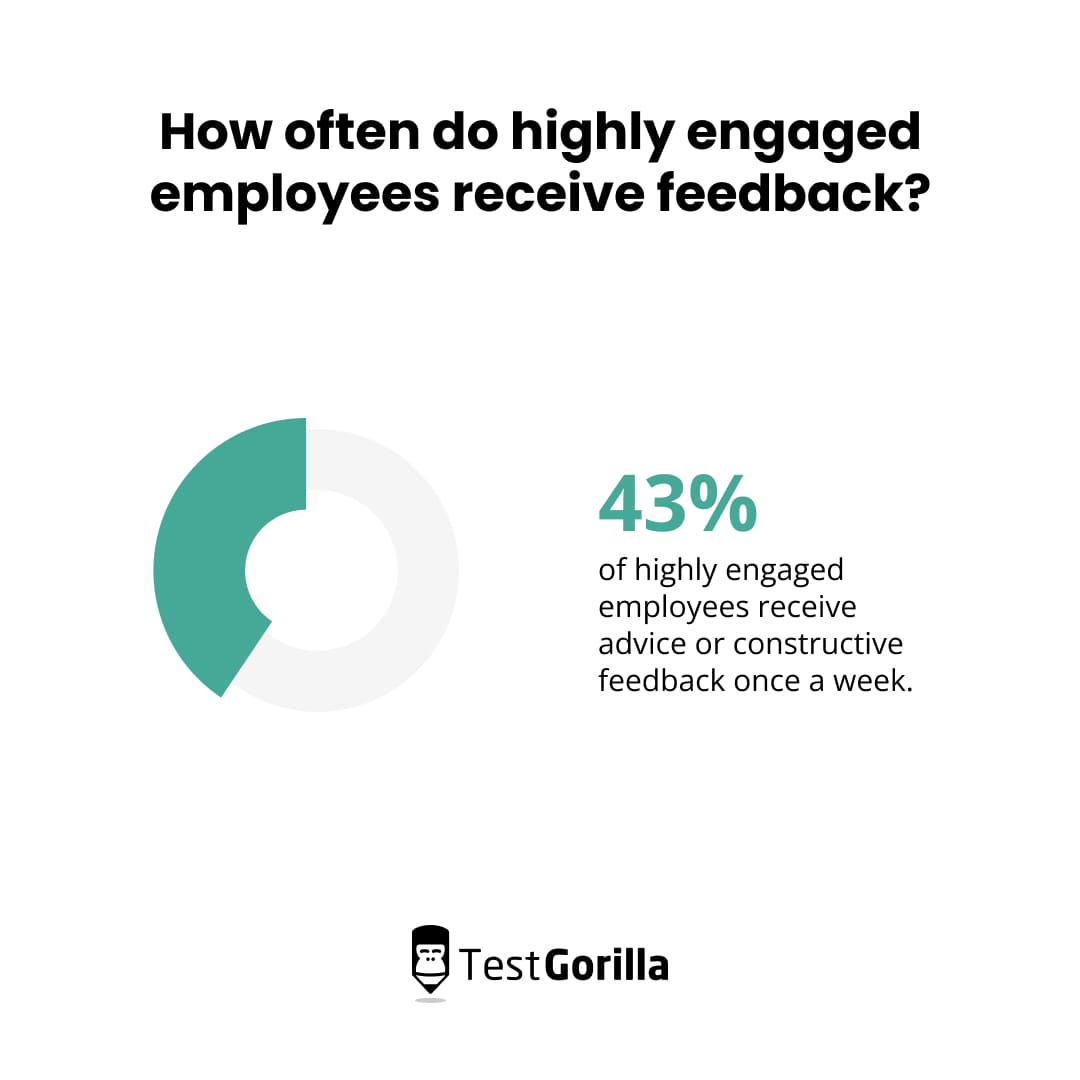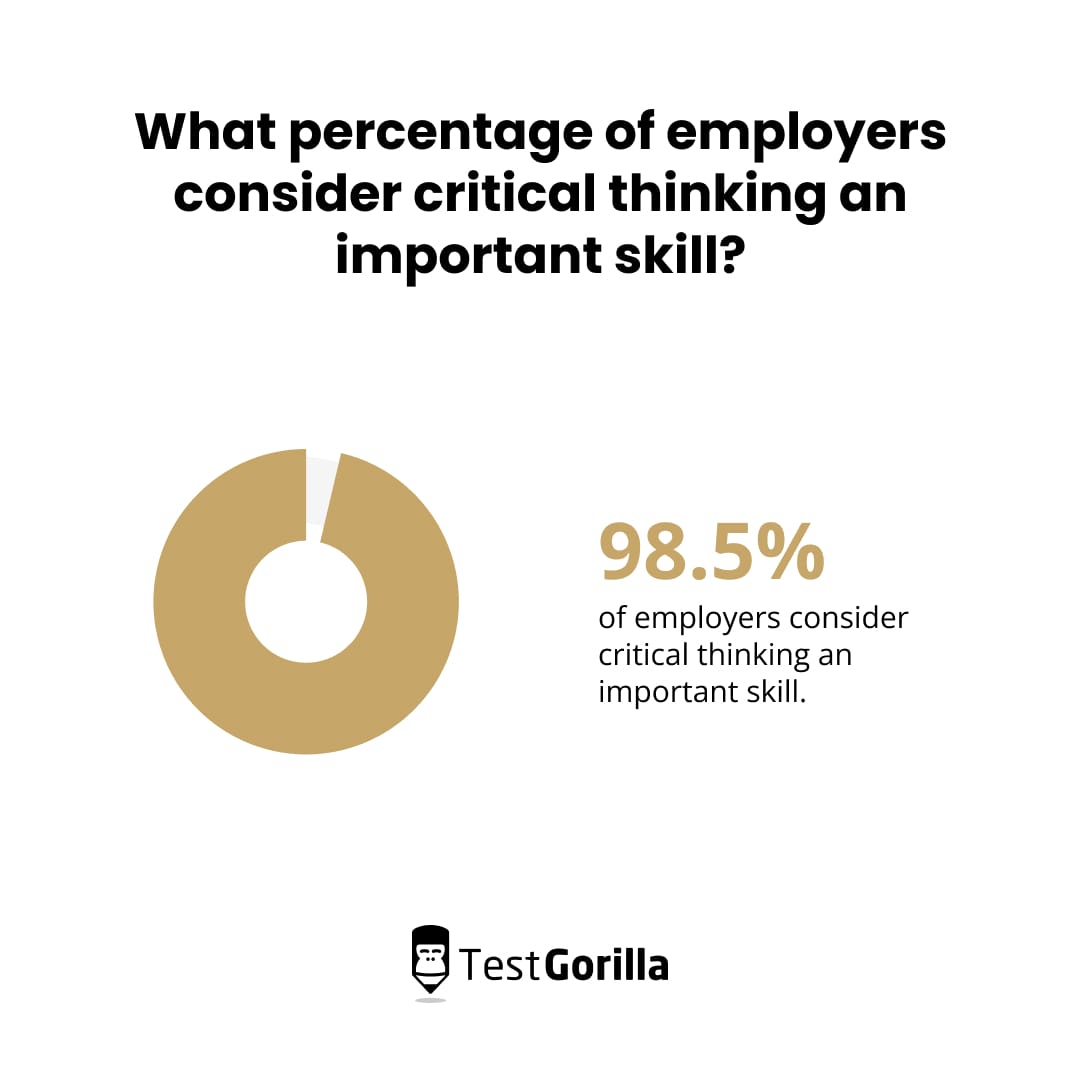Hiring the perfect product manager for your team can be a real challenge. Not only do you need a skilled individual who can meet the technical demands of the role, but you also need someone who can handle challenging products, manage product launches, and work well with your overall team.
Asking the right questions is an important element of the process, but we have another secret to success: combining the right questions with professional skills assessments to ensure you find the perfect candidate
The good news is that finding the skill tests for your candidates’ assessments is easy – TestGorilla’s Product Management skill test is the most comprehensive expert-crafted product management test, making reviewing applicants straightforward.
Once the skills tests are taken care of, you can then integrate a selection of the 25 product-manager interview questions we’ve collated to help understand your candidates’ knowledge fully. Build your list and interview candidates easily by choosing the right questions for your applicants.
Table of contents
25 product-manager interview questions for reviewing candidates’ skills
In addition to the right skills tests, it is important to be able to speak to your candidates to learn more about their product management skills, experience, and knowledge and find out about their careers so far.
To help, here are 25 product-manager interview questions to ask them.
1. What are product managers responsible for?
Candidates should know that product managers are responsible for brainstorming and researching new product ideas, thinking of ways to improve the company’s products, designing and producing new products, and analyzing data to determine how to improve a product.
There are around 15,400 product manager openings in the US, many of which require product managers to manage teams and complete product planning strategies.
2. Which skills are important for product managers?
Team building and negotiation are two crucial skills for product managers. While team building can help product managers form a successful team, negotiation skills will make it easier to agree on product deliverables, such as prices and timelines. Your candidates should be able to explain and provide examples of how they have used these skills in their current roles.
To assess an applicant’s negotiation skills before the interview, you should use our Negotiation skill test – it’s easy, reliable, and fast.
3. Are there any skills you need to refine as a product manager?
Even candidates with advanced product-manager skills will need to develop in certain areas. For instance, if their project-management skills are not as strong as their team-building skills or agile knowledge, they may need to enhance their project-management software knowledge by completing a course or extra reading.
Our Project Management skill test is the most efficient way to assess your candidates’ project management skills and sub-skills. Use it before conducting interviews for a faster candidate shortlisting process.
4. How would you include data in your work?
From analyzing whether the business has increased its return on investment to making product changes according to metrics, product managers can use data to achieve many objectives.
Consider whether your candidate understands different metrics, such as email sign-up data, customer reviews, and product comments.
5. Which factor helps you determine if someone has designed a product well?
Your applicants should understand that their customers will ultimately judge how well a product is designed. They should also know that successful products are those that meet a client’s requirements and that good product managers ensure the product achieves that.
6. Have you ever coordinated a product redesign? How did you do this?
Product managers should establish goals for redesigning a product by looking at market analysis data. With an understanding of the data, they can focus on the actions required and communicate and delegate the key responsibilities among team members.
Coordinating product redesigns involves liaising with stakeholders, so check whether your candidates have experience communicating with partners, asking once again for examples.
7. Should product managers prioritize speed or efficiency when launching products?
Both speed and efficiency are important for product managers when launching products. For this reason, candidates should know how to create a product launch roadmap for their team, estimate deadlines, and create maps that reflect the customer journey.
These methods help product managers to achieve both efficiency and punctuality when launching products.
8. What do you enjoy about being a product manager?
Candidates may enjoy many things about being a product manager. Look for answers that convey their passion, describing successful projects and showing enthusiasm for working with a product team.
Consider whether their enthusiasm is reflected in company metrics after launching products to gauge if your applicants’ commitment yields results.
9. Are there any aspects of product management that you find challenging?
Any candidate will find some aspects of product management challenging, but they should have methods to address them. For instance, your candidates may find project delays frustrating. In that case, they should try to establish methods to make realistic predictions for product launches. The key is to look for candidates who can communicate how they minimize the challenges of product management and rectify any issues they experience.
It can also be useful to ask candidates about a challenge they have faced and the steps they took to overcome it.
10. How would you handle negative responses to your product’s key feature?
43% of highly engaged employees receive advice or constructive feedback once a week, and product managers are no exception. After receiving negative responses about a product’s key features, product managers may use data to determine which action to take.
Applicants should know that certain metrics ensure their teams remain objective when working through negative responses. They should understand that this helps team members avoid disagreements when implementing product changes.
11. Which method would you use to work with designers and engineers?
Can your applicants explain that stepping back, avoiding micro-managing, and empowering each team member can lead to excellent product-design processes and launches?
Candidates should also know that communicating in a way that works for both teams can be the key to helping teams collaborate more efficiently.
12. How would your team rate your data-analysis skills?
Data analysis is a key skill for product managers. It’s not enough for applicants to claim they have excellent data-analysis skills – they should also have the knowledge and experience to prove it. For example, candidates may have reflected on collated metrics before launching a product or assessed the facts and stats to make their case when altering a product’s features.
If you’re looking for ways to assess your applicant’s data-analysis skills, our Working with Data skills test and Exploratory Data Analysis test are excellent options that eliminate your reliance on screening resumes.
13. How would you monitor performance and product success?
Analyzing key performance indicators (KPIs) is the best way for product managers to monitor performance and product success. Your candidates should know the main KPIs, such as customer retention, churn, lifetime value, satisfaction, time to execute, and team velocity. These can make monitoring product performance easier.
14. Which method would you use to describe your product to a customer?
As well as understanding the customer’s pain points and explaining how the product solves a customer’s needs, candidates should know that sharing the product’s key features is the ideal way to describe a product to a customer.
It’s crucial that candidates completely understand the product, so brushing up on the product’s benefits is also essential.
15. Name your biggest product-management failure.
By asking this question, you can test your candidate’s critical-thinking skills as they determine the cause of the product-management failure. You can also determine whether your applicants learned from the failure.
Candidates may give examples such as poor product launches or product delays due to team disagreements. As long as they learn from their product-management failure and practice ways to improve, the failure itself may not be a serious problem – the real test is in how they fixed the issue and what they learned.
16. Which method would you use to communicate or share your product strategy?
Using data to back up a product strategy is fundamental and can make communication and product strategy sharing easier. Data can help project managers align their product strategy with customers’ needs – it also gives them an objective look at every customer’s preferences.
Product managers may also use a roadmap to share the planned timeline with team members and stakeholders.
17. Explain the difference between product and project managers.
Although project managers are responsible for driving activities via meetings, specifying which team members will handle specific tasks, and handling budgets and timelines, product managers are similar to business owners.
Candidates should know that product managers take responsibility for whether the product meets customer requirements when released on the market.
18. Name your best product and describe what made it successful.
Candidates shouldn’t just name a successful product when responding to this product-manager interview question. They should be able to state various quantitative and qualitative metrics that show a product’s success.
A variety of metrics can help reflect product success, including revenues, user counts, and value. The best candidates can cite statistics and percentages when describing their best products.
19. Name a difficult decision you had to make in your product management career.
Applicants with product-management experience should understand that complex decisions are essential to a product manager’s role. Whether trying to convince a team to change a product or choosing the ideal number of resources to allocate to a product, product managers require advanced decision-making skills.
Listen out for responses that indicate your candidates make informed decisions or use metrics to make decisions in difficult situations.
20. How do product-management teams contribute to enabling sales?
The best product managers will welcome the chance to enhance the sales and marketing side of launching a product. They will take the time to support and contribute to the sales journey roadmap, enhance customer interactions with release description documents, and assist teams that identify high-value prospects.
21. Explain why critical-thinking skills are fundamental for product managers.
When handling day-to-day responsibilities, a product manager must frequently make decisions on how to manage a product, launch strategy, and allocate resources. Critical thinking is an essential skill for each of these responsibilities, helping product managers assess the available facts, metrics, and evidence to develop innovative product-related options.
98.5% of employers consider critical thinking an important skill. The simplest way to review product managers’ critical-thinking skills is to use our Critical Thinking skill test, which will help you learn if candidates can evaluate information before making sound judgments.
22. How would you rate your problem-solving skills as a product manager?
Developing products that help users handle their problems is at the core of a product manager’s role. But it’s more than just creating new products or features. Product managers have to solve internal issues and create products to enhance processes.
Solving problems is important at all points of the product life cycle, so candidates should have problem-solving skills.
To assess your applicants’ problem-solving skills, look no further than our Problem-Solving skill test and ask follow-up product-manager interview questions related to complex product-design scenarios.
23. Explain why time management is essential for product managers.
Most product managers must meet multiple demands as the go-between for various departments. From product design to launch, product managers will have to prioritize a variety of responsibilities. Managing these demands within a certain timeframe to meet deadlines is critical, so time management is a crucial skill.
Finding a method to assess your applicants’ time-management skills may be easier than you think – our Time Management test is the best shortcut to learning about your candidates’ abilities.
24. How would you rate your communication skills as a product manager?
Product managers must be able to communicate with their team, stakeholders, and external teams. Excellent communication skills can facilitate sharing the vision for the product and the product-design process. Look for evidence that your candidates have experience communicating with various individuals and teams to launch successful products.
Our Communication skill test is ready for you to use as an easy way to assess your applicant’s communication skills.
25. Explain why leadership skills are important for product managers.
Since product management requires team management, leadership skills are crucial for product managers. The best product managers have experience leading a team and the skills to facilitate project delegation, maintain team motivation, and ensure smooth stakeholder collaboration processes. Listen out for responses that indicate your candidates have leadership experience and ask for specific examples.
If you aim to assess your applicants’ leadership skills, consider our Leadership and People Management skill test, which will help assess various core sub-skills
Why should you use skill tests before interviews when hiring product managers?
Using skill tests before interviews will give you many advantages when hiring product managers. As well as noticing which applicants lack the required product-management skills earlier in the hiring process, you can also mitigate unconscious bias by relying on your candidates’ skill-test results instead of a first impression.
All candidates receive the same questions and the same amount of time to respond to the questions, so the assessments are fair and bias-free.
Another benefit of completing hiring processes in this order is that you can save time when creating a shortlist of candidates by getting rid of resume screening. And as a bonus, your candidates’ test results will provide guidance for your interview questions.
Assess top talent with our assessments and interview questions for product managers
Streamlining your hiring process when assessing product managers for your company is as easy as using skills assessments and the right product-manager interview questions.
The great news is that you have everything you need to review your candidates without bias – with our Product Manager skill test and accompanying tests, you can assess applicants quickly and objectively.
Go to our test library today to find the most reliable skill tests to shortlist product managers for the interview stage and make sure you find the perfect candidate for your next role.
Related posts
Hire the best candidates with TestGorilla
Create pre-employment assessments in minutes to screen candidates, save time, and hire the best talent.
Latest posts
The best advice in pre-employment testing, in your inbox.
No spam. Unsubscribe at any time.

Hire the best. No bias. No stress.
Our screening tests identify the best candidates and make your hiring decisions faster, easier, and bias-free.
Free resources
This checklist covers key features you should look for when choosing a skills testing platform
This resource will help you develop an onboarding checklist for new hires.
How to assess your candidates' attention to detail.
Learn how to get human resources certified through HRCI or SHRM.
Learn how you can improve the level of talent at your company.
Learn how CapitalT reduced hiring bias with online skills assessments.
Learn how to make the resume process more efficient and more effective.
Improve your hiring strategy with these 7 critical recruitment metrics.
Learn how Sukhi decreased time spent reviewing resumes by 83%!
Hire more efficiently with these hacks that 99% of recruiters aren't using.
Make a business case for diversity and inclusion initiatives with this data.





















